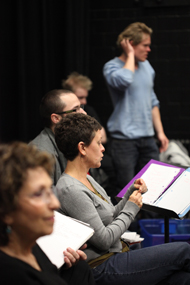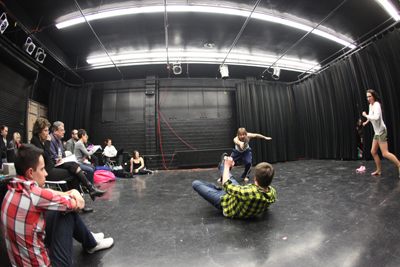by A&S staff
photos by Dana Rogers
A basic connection between the texts of theater and their staging as performance is undeniable. Yet, in most universities today, these disciplines tend to be rigidly divided into separate colleges and departments – literature and languages; the performing arts. In an effort to join together what should have never been separated, Arts & Sciences French professor Suzanne Pucci from the Department of Modern and Classical Literatures, Languages, and Cultures and Fine Arts professor and chair of Theater DepartmentNancy Jones are collaborating on a class which celebrates the connection between written text and performance.
 Their interdisciplinary partnership centers around the translation and production of an 18th century French play to be staged at the end of the spring 2011 semester. Pucci’s French students have provided the English translation and contextual material necessary for understanding and interpreting the comedy, Marivaux’s Arlequin Polished by Love (Arlequin poli par l’amour). At the other end, Jones’ theater students bring the translated written text to life on stage, endowing this eighteenth-century French play with an embodied contemporary reality.
Their interdisciplinary partnership centers around the translation and production of an 18th century French play to be staged at the end of the spring 2011 semester. Pucci’s French students have provided the English translation and contextual material necessary for understanding and interpreting the comedy, Marivaux’s Arlequin Polished by Love (Arlequin poli par l’amour). At the other end, Jones’ theater students bring the translated written text to life on stage, endowing this eighteenth-century French play with an embodied contemporary reality.
This intriguing project grew out of a conversation between colleagues over ten years ago. Now on their third collaboration, both Pucci and Jones are excited to be working together again.
>>View the entire photo gallery
“This is like a marriage – she tells it one way, I tell it another,” Jones laughed. “I have a deep love of French classical play and literature and experience working with French texts. The projects opened my mind to the depth of the history and culture of the time period – which opens up the intensity of the text around the play.”
“We are so different and that’s what makes the collaboration so exciting since we bring our distinct perspectives, personalities, and specializations to the project,” said Pucci.
Extremely interested in interdisciplinary and cross-cultural exchanges, Pucci and Jones have tailored the class of French and Theater students to reflect these connections. The French contingent takes part in the dramaturgy for the play, addressing psychological, historical, and cultural issues, which help guide the actors in their interpretation. Such an opportunity allows for an exciting collaboration between the liberal and performing arts. The presence of French language and culture in the preparation of the stage performance will enhance the Drama student's intellectual and cultural grasp of the play, while the stage performance will enrich and animate the French student's understanding of Marivaux’s comedy. The course traverses two languages, two cultures, and two time periods as well as two complementary disciplines. Pucci’s French students provide the translation of the text and they also prepare the actors through short presentations informing them about pertinent religious, social, political, or cultural issues of the time. In turn, the theater students engage French students in stage practices, techniques and theories of performance, from the development of costumes and scenery to the use of movement, music, and the delivery of lines, to the discussion of such complex questions as, “What is comedy?”
“One of the exciting elements of this collaboration for students is that they can begin to imagine this other period, a moment of a past century; yet, the play is done in a way that brings this historical past into the present,” said Pucci. “I realize how important it is in my own teaching when examining the 18th century, for instance, to bring students to an understanding of the text’s themes and concerns by relating them in their similarities and differences to our culture today.”
While on paper theater students enroll in one class and French students another, both professors stress the amount of communication between the students due to joint projects and sessions.
“The nature of the experience is that there are not two separate classes,” Jones said. “They all learn the dances, the music, costumes, acting – you don’t get to sit out.”
 “We want them to learn what happens at each step and with this sharing, they are encouraged to form core groups that compliment and help each other,” said Pucci. “In our past collaborations, the boundaries between gender, disciplines, and languages gave way which created an incredible sense of community during the process. Most important, students realize that literary interpretation is not an abstract activity but has immediate consequences in the concrete staging of the play.”
“We want them to learn what happens at each step and with this sharing, they are encouraged to form core groups that compliment and help each other,” said Pucci. “In our past collaborations, the boundaries between gender, disciplines, and languages gave way which created an incredible sense of community during the process. Most important, students realize that literary interpretation is not an abstract activity but has immediate consequences in the concrete staging of the play.”
Jones and Pucci are looking forward to the upcoming performances and credit their prior collaborations with improving their perspectives on their own disciplines. They are using the experience they gained from their interdisciplinary partnerships and are working toward the development of a New Learning Community called “Language and Performance without Borders.”
“Over the course of our collaborations, we’ve learned how to communicate better with each other and learn from our different ways of approaching a topic or subject,” Jones said. “As a faculty member, there is no better way for me to get enthusiastic and thinking in new way about course materials because it simply gets you out of the building you work in and out of the record groove routine we often find ourselves in.”
The New Learning Community will help create a network between departments in A&S and Fine Arts which would connect the study of languages, literatures, and cultures with theater, music, and art history. Jones and Pucci believe this innovative type of network will lead to a greater number of interdisciplinary collaborations across Colleges whether in joint classes or other university and community-based projects.
“It’s exciting to use your expertise in a new way, to look at something in a broader scope,” Pucci said. “It is my hope and belief that we can find other similar and diverse ways to make this magic happen for students, for faculty, and for the community.”
The collaborative play, “Arlequin Polished by Love” was written by 18th century French playwright Marivaux. The play showed as part of the World Theater Festival, on April 16th and 17th, 2011 at the Downtown Arts Center in Lexington.
